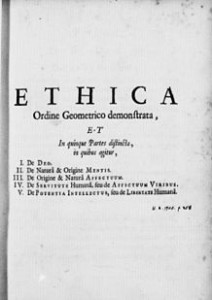
Arquivo para May 9th, 2016
Brazilian environment and Espinoza´s ethics
Baruch Spinosa (1632-1677) was a distinguished thinker of early modernity as well as Leibniz makes a bridge with the scholastics through a category called substance to stop it substance is what it is, that is, an essence and here is kinship with the substance of Lebniz (1646-1716).
well as Leibniz makes a bridge with the scholastics through a category called substance to stop it substance is what it is, that is, an essence and here is kinship with the substance of Lebniz (1646-1716).
I read this book in my teens, and I found myself a stupid later I read an old book of Will Durant where he said: “,,, Espinosa is not a philosopher to be read, but studied …” and says more front “… do not expect to get the essence in a quick read …” phew that good, was not so ignorant, but it was nice to think that at the time.
It was Durant also gave me the biggest tip to read it that to understand his “Ethics” had to have three key words: “substance, attribute and mode,” and seeing a beautiful Reissue EDUSP (University of São Paulo editor, 2015) on a colleague’s desk, thought was now to reread it, a little less ignorant that almost half a decade ago.
Had a more motivation, which is spoken today of ethics seems a little on the basis of a fanatical fans of a team, then had to rediscover what was my first contribution, it substance is defined as follows: “By substance I understand what is in and of itself it is designed; ie, that whose concept does not need the concept of another thing which is to be formed “(I, definition 3) (EDUSP, 2015, p. 45).
Mode means any particular shape or figure fleetingly reality assumes, oh this is good for my analysis that we are in a very transient form of ethics.
So lack understand the attribute, it is here that he will distance themselves from the scholastic and Descartes, understand: “Why attribute understand what the intellect perceives of substance as constituting the essence of it” (I, definition 4) (EDUSP, 2015, p. 45).
In the period in which Hobbes (1588-1679) defended absolutism, Espinosa was already democrat, to him the purpose of the state was not to avoid war, but promote human goods, and their ethics was that we learn to share the reason (only more democracy leads to it) to the extent that we abandon the enslaving passions (political or partisan fanaticism), the parentheses are our cyclical observation.

